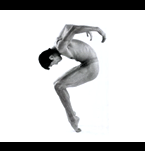| Printable
Version
April 18, 2003
'DANCE SALAD' INGREDIENTS
TOUCH HEARTS AND MINDS
By Molly Glentzer, Copyright
2003 Houston Chronicle
Dance Salad producer Nancy Henderek
has outdone herself this year. In three nights, she's packing
in glimpses of as many companies as you're likely to see at monthlong
festivals on the East Coast. Thursday's Wortham Theater Center
opening offered six U.S. and three Houston premieres.
Henderek curates the show like a gallery
director, piecing bits of evening-length works -- typically pas
de deux -- into "new" suites. This works better with
some dances than others if you don't read the program. The current
crop bears her signature preference for stark, unrelenting modernism.
More comic relief might have made me forget the show was three
hours long, but that's like complaining about too many eggs in
one's Easter basket.
While there wasn't a thematic thread,
it was a big night for limbs. Quaking hands were like exclamation
points in Memphis, Pointless Pastures,
Requiem and Sigue -- variously representing
frustration, confusion and anger. There were more than a few intentionally
sickled feet, suggesting vulnerability. But there were also exquisitely
pointed and arched feet punctuating the jaw-dropping extensions
of super-human dancers.
There was so much spectacular dancing,
it's impossible to pick favorites. Among the strongest lingering
images is the memory of five Buglisi/Foreman Dance Company figures
-- stylistic descendants of Martha Graham -- in Jacqulyn Buglisi's
Requiem. Poised atop boxes in shafts of gold light that
recalled the dusty, morning-after dawn of New York's Ground Zero,
they moved mostly in stunningly powerful unison. They raised their
arms like a row of mourning Liberties and tested the air below
with searching feet.
Equally shattering was the end of Sigue,
in which Netherlands Dance Theatre's Paul Lightfoot and Sol Léon
lay crumpled on the floor, while dancing rivulets of flour snowed
on them through the spotlight. It was a moment of utter human
stillness after a compelling battle between his naked athleticism
and her buttoned-up severity.
Göteborg Ballet's Uta Guttler
had stinging pathos. She was Jorma Uotinen's Blue Ballerina,
part Giselle and part Swan Queen, but all used up and barefoot.
She wandered across a stage littered with flowers, disoriented
as a mad sleepwalker, while five men in top hats leaned to-and-fro
below huge balloons. This Magritte moment made me want to see
the rest of Ballet Pathetique, from which it was excerpted.
In stark contrast was the nimbleness
of the Cullberg Ballet's Rafi Sadi and Vanessa de Légniere
in Mats Ek's delightfully quirky Pointless Pastures.
David Dawson's The Grey Area
was a cool, abstract ballet that evoked a netherworld between
birth, or maybe death, and life. It was danced compellingly by
its original Dutch National Ballet cast. The super-strong Sofiane
Sylve, who joins the New York City Ballet next season, was a standout.
The National Ballet of China's Jian
Zhang and Jie Sun brought good drama to Ben Stevenson's traditional
classicism in excerpts from his recent Fountain of Tears.
Gica Alloto, Lavinia Bizzoto and Valeska de Souza Goncalves of
Brazil's Quasar Companhia de Danca were fluid and strong. They
were two lovers split apart -- momentarily -- by a femme fatale
on a huge red velvet couch in Henrique Rdovalho's Mulheres.
Chrystal Brothers and three partners from the Memphis Ballet
were excellent in the rough-house partnering of a scene from Trey
McIntyre's Memphis.
Tonight's 7:30 program repeats Memphis,
Sigue, Kurt Weill and Mulheres. It
also features dancers from the Royal Swedish Ballet in works by
Virpi Pahkinen and Kenneth Kvarnstöm, plus two Hans van Manen
masterworks and Robert Battle's Takademe.
Back
to Concert 2003 | next
review
Copyright © 2002 Dance Salad. All rights reserved.
|

